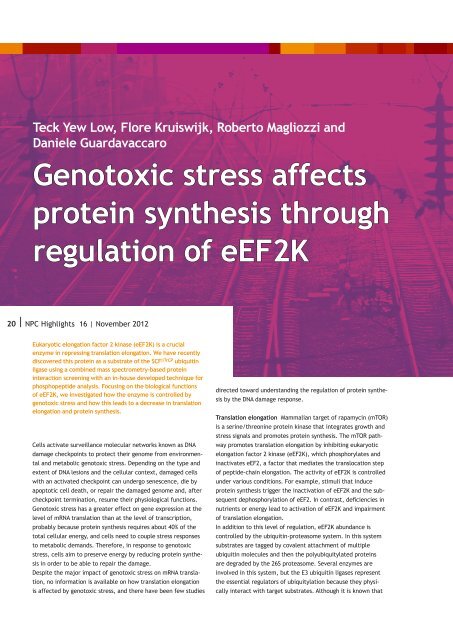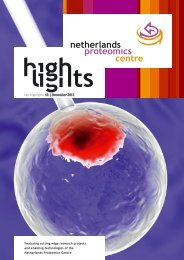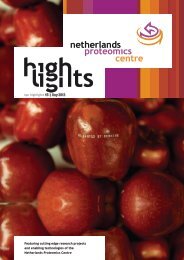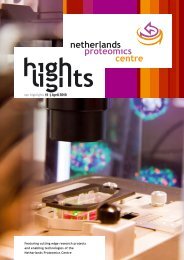Teck Yew Low, Flore Kruiswijk, Roberto Magliozzi andDaniele GuardavaccaroGenotoxic stress affectsprotein synthesis throughregulation of eEF2K20 | <strong>NPC</strong> Highlights 16 | November 2012Eukaryotic elongation factor 2 kinase (eEF2K) is a crucialenzyme in repressing translation elongation. We have recentlydiscovered this protein as a substrate of the SCF βTrCP ubiquitinligase using a combined mass spectrometry-based proteininteraction screening with an in-house developed technique forphosphopeptide analysis. Focusing on the biological functionsof eEF2K, we investigated how the enzyme is controlled bygenotoxic stress and how this leads to a decrease in translationelongation and protein synthesis.Cells activate surveillance molecular networks known as DNAdamage checkpoints to protect their genome from environmentaland metabolic genotoxic stress. Depending on the type andextent of DNA lesions and the cellular context, damaged cellswith an activated checkpoint can undergo senescence, die byapoptotic cell death, or repair the damaged genome and, aftercheckpoint termination, resume their physiological functions.Genotoxic stress has a greater effect on gene expression at thelevel of mRNA translation than at the level of transcription,probably because protein synthesis requires about 40% of thetotal cellular energy, and cells need to couple stress responsesto metabolic demands. Therefore, in response to genotoxicstress, cells aim to preserve energy by reducing protein synthesisin order to be able to repair the damage.Despite the major impact of genotoxic stress on mRNA translation,no information is available on how translation elongationis affected by genotoxic stress, and there have been few studiesdirected toward understanding the regulation of protein synthesisby the DNA damage response.Translation elongation Mammalian target of rapamycin (mTOR)is a serine/threonine protein kinase that integrates growth andstress signals and promotes protein synthesis. The mTOR pathwaypromotes translation elongation by inhibiting eukaryoticelongation factor 2 kinase (eEF2K), which phosphorylates andinactivates eEF2, a factor that mediates the translocation stepof peptide-chain elongation. The activity of eEF2K is controlledunder various conditions. For example, stimuli that induceprotein synthesis trigger the inactivation of eEF2K and the subsequentdephosphorylation of eEF2. In contrast, deficiencies innutrients or energy lead to activation of eEF2K and impairmentof translation elongation.In addition to this level of regulation, eEF2K abundance iscontrolled by the ubiquitin-proteasome system. In this systemsubstrates are tagged by covalent attachment of multipleubiquitin molecules and then the polyubiquitylated proteinsare degraded by the 26S proteasome. Several enzymes areinvolved in this system, but the E3 ubiquitin ligases representthe essential regulators of ubiquitylation because they physicallyinteract with target substrates. Although it is known that
What this research is about:How the ubiquitin-proteasome systemcontrols fundamental cellular functions“Daniele Guardavaccaro started as a new group leader at the Hubrecht Institute in 2008 and came to us with a veryinteresting biological question,” says Teck Yew Low, researcher at the <strong>NPC</strong> and Biomolecular Mass Spectrometryand <strong>Proteomics</strong> group (Utrecht University) and highly experienced in new techniques for analysing proteins.“Guardavaccaro wanted to know which proteins bind to specific enzymes, known as E3 ubiquitin ligases.” Theseenzymes tag proteins that need to be destroyed by attaching a small protein called ubiquitin to them. Next, a complexcalled proteasome seeks out and destroys all molecules with the ubiquitin tag. By finding proteins bound to E3,one may discover new targets that are marked for destruction by the ubiquitin-proteasome system.Guardavaccaro, Low and colleagues identified many novel E3 binding proteins. One of them, an enzyme knownas eEF2K, is a key repressor of mRNA translation — the process by which mRNAs are translated into proteins. Theresearchers zoomed in on eEF2K and found important details on how mRNA translation is regulated. Translation isa process that requires a considerable amount of energy. “We found that when the cellular DNA is damaged, forexample upon exposure to chemical mutagens, the repressor of mRNA translation (eEF2K) is rapidly activated andtranslation is temporarily slowed down. As a consequence, a large amount of energy is saved and used by the cellto fix the damaged DNA. Once the damaged DNA is repaired, the repressor of translation is first tagged by ubiquitinand then destroyed by the proteasome. As a result, mRNA translation is resumed,” explains Low.In this research, Low and colleagues also carried out extensive analysis of proteins modified by phosphate groups(phosphoproteins). “Regulation of proteins by phosphorylation is the prevalent mode of regulation of protein functionand its study is essential in our research. We frequently apply a number of techniques recently developed inour lab to enrich for phosphoproteins and facilitate their analysis by mass spectrometry.” Low and Guardavaccaroare currently continuing their collaboration to analyse other E3 binding proteins.| 21<strong>NPC</strong> T1: Cancer <strong>Proteomics</strong>Figure 1 | The structure of the SCF βTrCP ubiquitin ligase and its phosphorylation-dependentinteraction with the substrate. The F-box protein βTrCPis the substrate receptor subunit that recruits specific substrate proteins.Through its WD40 β-propeller structure, βTrCP recognises a diphosphorylatedmotif with the consensus DpSGXX(X)pS in which the serine residues are phosphorylatedto allow interaction with βTrCP.eEF2K abundance is controlled by the ubiquitin-proteasomesystem [1], the biological importance of the ubiquitylation anddegradation of eEF2K and the identity of the E3 ubiquitin ligaseinvolved are unknown.<strong>Proteomics</strong> screening To identify substrates of the ubiquitinligase SCF βTrCP (see Figure 1), we used immuno-affinity chromatographyfollowed by tandem mass spectrometry (MS/MS) [2].First, we expressed FLAG–hemagglutinin (HA) epitope–taggedβTrCP2 (FLAG-HA-βTrCP2) in human embryonic kidney HEK293Tcells and analysed by MS proteins that co-purified with FLAG-HA-βTrCP2 after sequential FLAG and HA immunoprecipitations.We identified nine unique peptides derived from eEF2K [3,4].Subsequently, by reciprocal immunoprecipitation with FLAG-HA-eEF2K, we recovered peptides corresponding to βTrCP1 andβTrCP2. This is not surprising since βTrCP1 and βTrCP2 shareidentical biochemical properties and substrates.The WD40 β-propeller structure of βTrCP binds its substrates(like eEF2K) through a diphosphorylated motif (phosphodegron)with the consensus DpSGXX(X)pS. The generation of severaleEF2K mutants with replacements of residues within this motifshowed that the motif surrounding Ser441 and Ser445 is highlyconserved and required for the binding of eEF2K to βTrCP (seeFigure 2A and 2B). Furthermore, we also showed that phosphorylationis required for the interaction of eEF2K with βTrCP. AneEF2K peptide containing phosphorylated Ser441 and Ser445 in-






